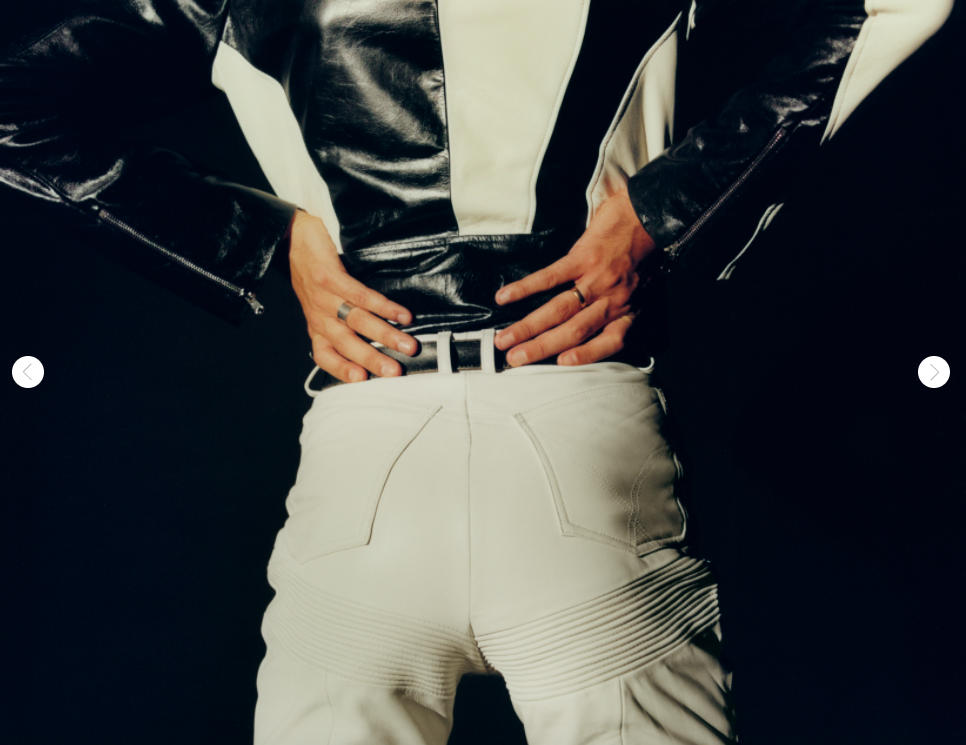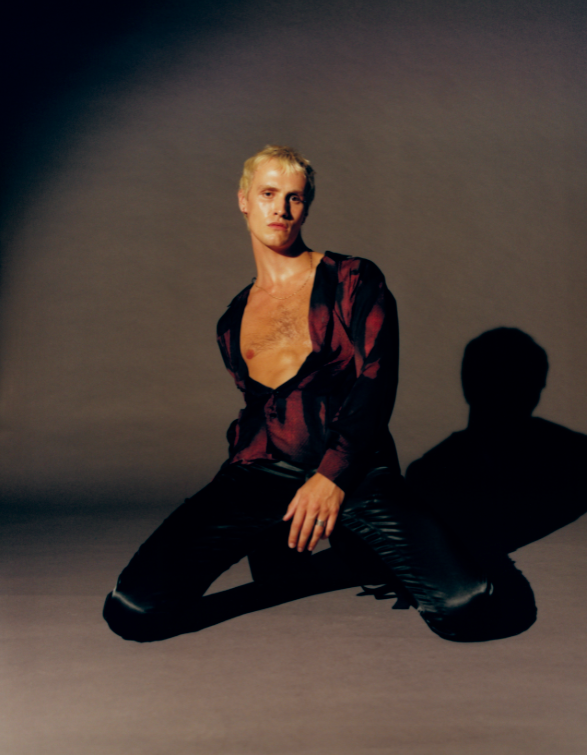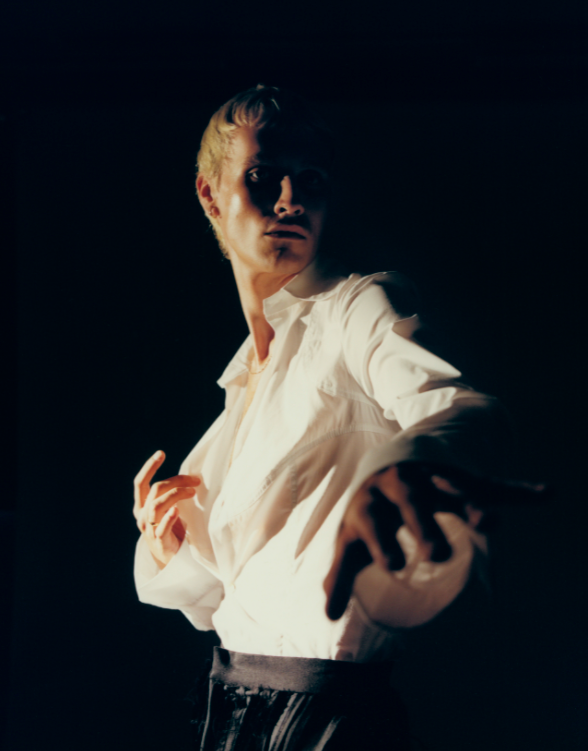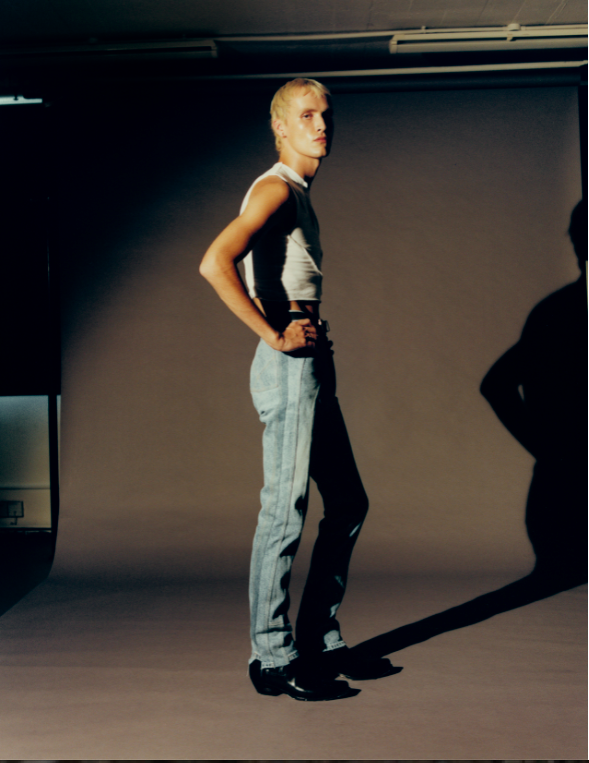Hero magazine (online): beau scarlett-pitt
published digitally july 2021
https://hero-magazine.com/article/192135/beau-scarlett-pitt
Subversive, but only because some chose to turn away from what was too their own. Bodies on display, pleasured and desired, writhing like unlit flames withstanding an exhale. When we say bodies we immediately think of a woman’s body, a place of genesis, an altar worshipped at because it is objectified, why do we not think of men in this way?
Beau Scarlett Pitt, a recent graduate of Kingston School of Art and menswear designer, seeks to shake these dynamics through her thesis collection titled She’s So Heavy. Through intentionally shadowed and hued imagery with a depth synonymous with luster culminating in an homage-paying calendar, Beau creates a narrative through character development that allows her and those she dresses to anatomize the intersectionality between identity, sensuality and sexuality. With a deep-nod to rock and roll and its formative aesthetics, Beau acknowledges the feeling of entrapment that plagued those women that chose the unconventional and recontextualizes the latter in today’s world in which men, are now ironically the inhibited ones as they remain unaware of the liberation that comes with vulnerability.
Lindsey: Hey Beau! Tell me about your childhood! Your collection oozes this rock and roll energy and I’m curious to know how these affinities were maybe absorbed from those subconscious years of influence.
Beau: My dad's a big AC-DC fan so I've always kind of aligned myself with that area of music. I was also obsessed with BBC Four music documentaries in my teens (*still obsessed), which for me was a springboard that led to discovering new things that helped me build my own references. I’ve always wanted to be a part of the music scene but knowing that I’m not really musically inclined, I wanted to get involved with it in another way and found that I could create an image to immerse myself within the world I admire so much. Fashion first came to me through dance at a very young age as I was always slightly more interested in the costumes than the routines. Performing built an attachment to music and fashion as an intertwined entity. I found that after interning in Paris, that there was an authenticity in creating something from your own point of you - I felt far more confident in putting myself into my work.
Lindsey: Yeah and I’m going to pause you on that word “authentic” because it’s become such a loaded term as a necessity of sorts to be factored into branding, marketing language, what have you. The meaning has really become muddled and it’s almost more so a feeling than a statement, how are you defining it?
Beau: The starting point for the collection was these 70s and 60s pornographic magazines that I came across at an antiques market in the back of a van. The colors and the characters were just so rich, I could see their stories played out in front of me. It painted a final image in my head that felt channeled to my connection with them and also their desire to express their sexuality. I wanted to show them through a different medium in which I could emphasize their creation in terms of how they were placing themselves. I wanted to show them through a different lens - to emulate the feeling and energy of irreverence that I drew from these women within the magazines. It’s this feeling that was the inception of the collection and culminated in the creation of the calendar.
Lindsey: Right and in this idea of building characters, you're also envisioning their point of view and there's probably a lot of empathy that comes into your practice as well.
Beau: Yeah there's an inherent feeling of empathy that fills me when I’m looking at these women because at the time, a lot of these women were cast out for being affiliated with the porn industry. It's not unrealistic that these women probably felt confined to societal condemnations that completely opposed the joy in exercising sexual freedom and self expression. I wanted to give these women a new voice to challenge taboos in sexual identity and to convey the fact that it’s okay to own this identity.
Lindsey: It's interesting because even today when we are so “liberated” by traditional standards, there’s still a feeling of being trapped by societal expectations reified by social media to be a certain kind of person, to exist in the “creative community.”
Beau: It’s a thing that always crosses my mind especially with the censoring that goes on on Instagram but also recently in applying for jobs. I feel like I have to sometimes present myself in a certain way and can't be my true sexy self when I want to be. It translates to the bigger picture of asking who we are allowed to be in front of people and for what purpose? In a way, these women had to choose between one path and another. When they chose the path they did, they couldn’t walk back. You look at Linda Lovelace who spent only a short time in the porn industry and it ‘haunted’ her whole life thereafter. These thoughts were very present in my mind along with the fact that not all of these women would have felt safe and so I really wanted to be careful with how I portrayed certain influences. It wasn’t just about taking inspiration from these women, I wanted to honour them.
Lindsey: The definition of care is also something that's really interesting, because when it comes to women, there's this notion of wanting to preserve our womanhood and to feel safe while also allowing distance from its traditional orientation in order to feel empowered. As you're utilizing care in your practice to portray the body, how are you defining that and how is that also maybe related to a sense of catharsis?
Beau: If you feel safe within your identity, that’s a massive thing. There's a certain extent to where you just can't give a fuck, you have to embrace yourself. There are so many anxieties now, especially for women and you have to ultimately protect yourself for every eventuality that might happen but wearing my sensuality on my sleeve makes me feel strong and helps me get through the day.
Lindsey: Right and embracing your sensuality is even a learned process and how were you able to find comfort in yours? There’s this duality being a woman to embrace sensuality while also not being boxed into being a sex symbol of sorts.
Beau: Yeah it’s definitely still an ongoing process and I'm constantly learning from my own sensuality. It makes me think of the film Sucker Punch when Babydoll is kicking-arse in these different fight scenarios and she has her game face on, but there isn’t so much of a hard exterior, and that almost makes her more of a threat. It’s her soft front that protects and nurtures her at the same time. For me, it’s really about knowing that strength within sensuality is about the confidence you feel and in turn and the adrenaline rush you experience from it. Being a sex symbol, for a woman used to take over your entire identity where as I feel male sex symbols had a lot more freedom to be more than that. Now, I feel we are experiencing a shift where the ‘box’ female sex symbols are put in is turning into more of a pool you can dip in and out of.
Lindsey: I'm hoping you can maybe even expand on what really the differences are between male and female sex symbols? Sex is sex, you know, but there yet are there are so many stark contrasts. In the process of designing you flipped this dynamic on its head in a way where you have the man wanting to embody and have all of these female qualities that resonated with his own eroticism.
Beau: Yeah, so like, in order to be with this woman, in his mind, he has to be her, but he can never really match her sensuality. Female sex symbols generally are known for less clothing and amazing bodies and the men are usually more covered, more trapped within their clothes. This feeling of entrapment is why I wanted to work with different aspects of a man’s wardrobe to infiltrate it with this kind of feminine sexual power. I wanted to embody him trying to discover a new part of himself. I enjoy the dynamics of a power play with the end result being that the man can never match the woman.
Lindsey: The idea of men feeling trapped is interesting and I don’t know that that’s ever occurred to me, I feel like maybe it’s also because they’re unaware themselves almost? Were there any discoveries that you had while designing and interacting with male peers that lead you to this conclusion?
Beau: Well, even with the trousers for example, they are all quite slim cut to emphasise the beauty of a shapely leg and during fittings, the model’s reaction was that of pleasant surprise because they gave him a beautifully sculpted arse. He looked in the mirror and was like, wow, he was almost scared. I fed off of this sense of men discovering more about their bodies during the making of this collection. Relating back to when I was fitting my models, I made this cropped tank top and they were surprised at how good it looked despite being like, I would never wear that sort of thing. All of these varying emotional reactions caused me to question if it genuinely made them uneasy or if it was a good kind of scary where it was something to lean into and experiment with.
Lindsey: It's also interesting how they're defining “scary” because is it mainly just a matter of feeling vulnerable for once? Maybe it’s just something they’re not used to feeling versus women having to feel vulnerable and exposed all the time. It’s like having to confront your own humanity almost and you’re providing a platform for men to do that because society is also very unforgiving. To segue, the process of aging has been on my mind lately and women have such an interesting relationship with aging as it is related to beauty standards. How is this also related to the sensuality you’re exploring?
Beau: It's sold to us as an insecurity as we develop. Social media influences our lives so much, it makes us vulnerable as you get older and you start to care less. I speak to my stepmum about this and she’s like, you don’t want to spend your years worrying about things that you won’t care about later. Everyone's susceptible to it but especially women because a lot of men in the sex symbol category are a lot older than the woman in that category is. It’s like we’ve got a sell-by date but I think that you can't put an age on sexy because it's a mood, it's an aura, it's a mindset as well, and you have to feel it to be it.
Lindsey: Yeah totally and it's also interesting to see how age has also become weirdly synonymous with like relevancy and for you as a designer, do you feel pressure in regards to being “relevant” and how does it affect you?
Beau: Even ‘making it’ at a young age seems like the norm now, when really, it can sometimes take a lot of time for creatives to develop their art. It’s something people should do and you shouldn’t feel this pressure to be the most amazing, next big thing within five minutes. People do focus a lot on young talent and I agree that they should, but there's also a need to nurture young talent in a way that doesn’t also burn them out after their five minutes of fame to where they’re struggling to keep up with demand. Sometimes you need to take time out to know what's relevant to you and what is relevant to the world you're looking out on. It’s challenging in an industry where things are being churned out left, right and center and authenticity comes from when you actually take time to reflect without letting doubt seep in, there's too much pressure nowadays.
Lindsey: Yeah it’s pressure and it’s the fact that people don't really have their own references anymore and success means having to exist on society’s collective moodboard. I feel like that’s why your collection really does kind of stand out because you do have your own set of characters and references. In relation to conformity, do you feel like there are enough platforms and outlets to represent and present your work? What can we begin to do differently?
Beau: I feel like a lot of people try to say they champion young talent when they actually don't respect it in the way that it should be. A lot of people pick up on a few hot new things and rightly so, but they get plugged a lot and it’s the same names going around. I’m not sure if it’s laziness but a lot of people don't really look that hard for creatives who haven't got a big Instagram following. It’s hard to get noticed in a way that then turns into another pressure of its own making you begin to question why no one is seeing your work. Sometimes it can be a task to convince yourself that your work is worth it, that it’s great, that you did it for a reason, you did it for you. I think there needs to be a lot more outreach from publications or initiatives taken to have a bit more diversity in the age range of talent featured. People feel if they haven't ‘made it’ in their youth, they're never going to make a dent in the industry. You have to look at your life and read it with context instead of at face value where you’re judging success by the things you have and the things you don’t. We have to reevaluate what success means because thinking of it in terms of this mass scale isn't a sustainable thing and it breaks people.
Lindsey: Right and there’s a difference between success and fulfillment and to go back to your collection, it has like this sexual energy but there is also this interesting duality in between fulfillment and pleasure but the latter doesn’t mean the first.
Beau: Yeah, so looking at the collection, the act of teasing was something I really wanted to convey. The tease comes in by tantalizing the senses with heavy musical influences by Lou Reed and Jim Morrison, they helped us get into character. When you're teased, you are in a way being led to be fulfilled. When you see something you like, you do feel fulfilled in that sense and so it becomes about picking these moments like they were a carrot dangling in front of you.
Lindsey: It’s interesting because you're not fulfilled unless desire was created first and the act of sustaining desire is a tricky thing.
Beau: Yeah for sure, it’s that initial attraction and that initial sense of fulfillment that comes from imagining how things are going to go, playing things out in your head.
Lindsey: Right and then you engage, you connect but what makes a connection? There’s an implicit sense of longevity to it, it’s sustainable intimacy. Was this important to you as you designed your collection?
Beau: Yeah as I was creating imagery around a whole vision that referenced the past, I realized that I didn’t want to keep up with a modern trend but more so, it was about reactivation and making that connection there. The jeans in the collection are made out of old Levi's and I find the underlying connection of the person who used to wear that pair and the new user very erotic. Jeans are a very sexual object to me, people treat them like a second skin. To take and reuse these jeans that different people wore to make a new pair feels like rebirthing it into an almighty jean made up of all these sensual references.
Lindsey: Right and as your collection references the past, we obviously know that nostalgia has been pervasive throughout the industry but how much of that reflects a larger desire for a collective sense of understanding. What is the difference between sexuality, sensuality and intimacy? And how are those things intertwined and conveyed throughout your practice?
Beau: I do a lot of character work when designing for anything and it’s essential for me to know that character inside and out by combining sound and image to help me shape my ultimate muse. I have to get into their head, to know how they feel. How they’d dance to a certain song. Who their loves are. What they desire. And there’s a certain intimacy to that for sure. Just knowing the power of your intimacy, as well as the sensuality you convey and the sexuality you feel when you’re in touch with the latter two, it’s the Holy Trinity. Experiencing the journey of getting to know and understand how these things move with you through your life is truly amazing. I think in my head, whoever wears my clothes really feels that internal rhythm with themselves and then as soon as the clothes come off, they’ll still be that person. Being able to change characters or a look is more just representative of the comfort you feel with yourself and these looks become tools for self discovery.




